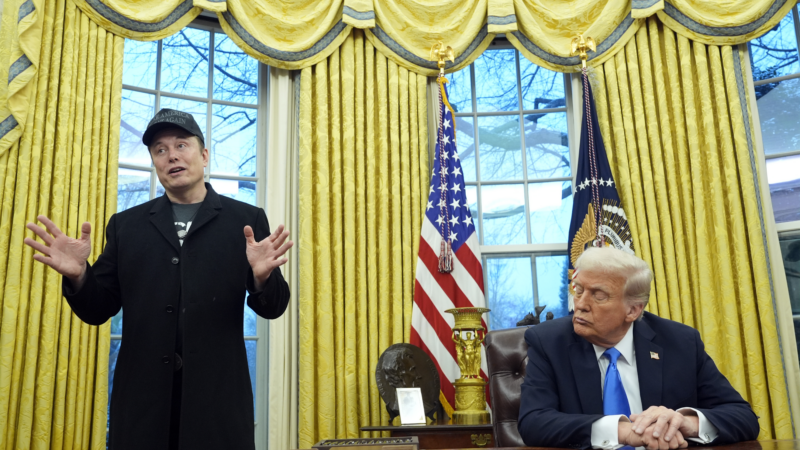Government Accountability official says fraud does exist, but it’s not widespread
President Trump and Elon Musk have vowed to uncover and eliminate fraud in the federal government, and the White House has pointed to a recent Government Accountability Office (GAO) report as evidence and justification for their ongoing efforts to take over and dismantle federal agencies.
The GAO is an agency under Congress that provides lawmakers and executive agencies with information about how efficiently and effectively components of the federal government are conducting their work.
So far, the Trump administration has not shown clear evidence of fraud.
Instead, the DOGE X account and White House Press Secretary Karoline Leavitt have pointed to the elimination of DEI — diversity, equity and inclusion — contacts and other expenditures that don’t align with the administration’s political priorities.
In a memo Wednesday, the administration said that “Trump is determined to be a good steward of taxpayer dollars and put an end to fraudulent and wasteful spending” and attached the GAO’s report.
A co-author of that report, GAO Director Rebecca Shea, tells NPR that while government fraud and waste makes up an estimated 3% and 7% of federal spending, the overwhelming majority of federal spending isn’t fraudulent.
Shea also noted that the report defines fraud narrowly — and that definition doesn’t match up with Trump and Musk’s definition. “To call something fraud, you need to prove it in a criminal or civil case,” she said.
Shea added that finding fraud takes a long time and adjudicating it takes even longer — which fraudsters take advantage of. In her GAO report, Shea suggested Artificial Intelligence (AI) could help the government catch the fraud.
“It can evolve a lot more quickly than a human might looking at the data themselves,” Shea said. “AI does offer promise when we’re able to use the data systems. There are a fair number of actual structured data sets that I think could be more readily used for fraud detection with AI capabilities, predictive modeling.”
Musk’s DOGE is reportedly working on a custom AI chatbot called “GSAi” in their effort to cut spending, according to the magazine WIRED.
But Shea cautioned that government use of AI does create its own risks.
“The flip side of that is fraudsters are using AI already to defraud federal programs,” Shea said. “And they are not hampered by the same guidelines and laws that the U.S. government is when it comes to AI. Fraudsters aren’t hindered in the same way.”
People from “all walks of life” commit fraud, even those inside the government, Shea said.
“Like anywhere there are going to be insider threats,” Shea said. “There were some government officials that were in the mix. Civil servants, contractors were also among those who were charged by the Department of Justice.”
While defending DOGE and its efforts, Musk has called the United States a “bureaucracy” rather than a democracy.
“A second American revolution is needed to free the people from their oppression by the bureaucracy!” Musk posted.
“We are happy that people are using our report, finding our information useful in the debate to try and improve federal service,” Shea said. “We have a duty of care to the taxpayer and we can do better. And we’re hopeful that our report helps us move in that right direction.”
When asked directly about Musk and the Department of Government Efficiency (DOGE) unit, Shea didn’t comment.
“I will abstain from providing an opinion on that,” Shea said. “That’s outside of my wheelhouse.”
Shea said she hasn’t personally been contacted by or worked with Musk or DOGE, though she confirmed U.S. Comptroller General Gene Dodaro, who has overseen GAO since 2008, has made contact with the Trump administration following the inauguration — as is customary.
Overall, Shea said the government is a good steward of tax payer dollars and is hopeful it will improve.
“[Annual fraud] represents between 3% to 7% of annual federal budgets in that time period,” Shea said. “Yes, it’s a big number, but the vast majority of spending is not fraudulent.”
Supreme Court allows Trump to resume mass federal layoffs for now
Justice Ketanji Brown Jackson, who was appointed to the court by President Biden, dissented.
Graphics: Where the Texas floods happened and how high the waters rose
One Guadalupe River gauge near Kerrville and Camp Mystic recorded a rise of more than 25 feet in two hours.
Haiti’s iconic Hotel Oloffson, long a cultural beacon, destroyed by gang violence
The Hotel Oloffson in Haiti's capital Port-au-Prince, long a haven for artists and writers, poets and presidents, a symbol of Haiti's troubled politics and its storied past, has been destroyed by gangs.
New books this week focus on Caitlin Clark, King Tut, and how ‘Democrats Lost America’
Plus: a new novel from Gary Shteyngart, a true story of a shipwreck, and a memoir from a wrongly incarcerated inmate who was exonerated after 28 years behind bars.
Shoes off at the airport? TSA appears to be giving the pesky rule the boot
For nearly twenty years, most air travelers in the U.S. have been required to remove their shoes when going through security. That requirement seems to be ending.
Texas flood recovery efforts face tough conditions as local officials face hard questions
Emergency responders kept hope alive as they combed through fallen trees and other debris that littered the hard-hit central Texas communities on the fifth day after devastating floods killed more than 100.








